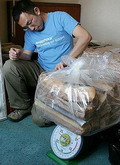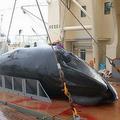 一項由綠色和平組織秘密進行的調查,證實捕鯨船「日新丸號(Nisshin Maru)」的船員涉嫌走私鯨魚肉,這些船員將日本南極捕獵行動中所捕獲到的優質鯨肉,偽裝成私人行李走私到陸地上之後,再透過貿易商進行非法交易。
一項由綠色和平組織秘密進行的調查,證實捕鯨船「日新丸號(Nisshin Maru)」的船員涉嫌走私鯨魚肉,這些船員將日本南極捕獵行動中所捕獲到的優質鯨肉,偽裝成私人行李走私到陸地上之後,再透過貿易商進行非法交易。
經密告人士指出,經營日新丸號的「共同船舶(Kyodo Senpaku)」捕鯨公司高階船員和官員,放任這樣的走私行為已長達十多年。
一位曾與「共同船舶」公司接觸過的檢舉人告知綠色和平組織,日本鯨類研究機構的官員曾登上日新丸號,在知道這樣的非法行為後卻沒有做出任何反應。日本鯨類研究機構是日本政府授權的非營利性組織,負責監督日本捕鯨行動,而所有捕鯨行動皆需取得國際捕鯨委員會研究性捕鯨條款的許可。
短片:綠色和平組織的呼籲
綠色和平日本鯨類保育負責人佐藤順一(Junichi Sato)表示:「我們所搜集的資料顯示,這件走私案的規模相當大,負責經營的捕鯨公司和日本鯨類研究機構沒道理不知道。」
日本政府宣稱這項已執行超過20年的捕鯨計劃完全合法,並且每年從日本稅金中提撥5億日圓(500萬美金)做為補助。
 環保團體現在極力要求召開聽證會,查明捕鯨計劃中貪污的情況和程度。除了公開聽證之外,綠色和平也要求終止給付捕鯨計劃補助金,以及撤銷「共同船舶」公司的捕鯨執照。
環保團體現在極力要求召開聽證會,查明捕鯨計劃中貪污的情況和程度。除了公開聽證之外,綠色和平也要求終止給付捕鯨計劃補助金,以及撤銷「共同船舶」公司的捕鯨執照。
佐藤進一步表示:「由於捕鯨的研究缺乏科學可信性,加上只有少數食用人口卻儲存大量鯨肉等等,使得日本捕鯨計劃在國際上已惡名昭彰。而今又因為自己國家內部的貪污案而捲入糾紛。現在應該是中止捕鯨計劃的時刻,應該將人民的稅金使用在更有意義的事情上。」
在國際捕鯨委員會為了保護遭到大量撲殺而瀕臨絕種的鯨魚,進而宣佈中止商業捕鯨行動的第2年,也就是1987年,日本即開始實施研究性的捕鯨行動。
A Greenpeace undercover investigation has revealed evidence of theft involving crewmembers on board the factory whaler Nisshin Maru, who are taking the best cuts of whale meat from whales caught during the Japanese Antarctic hunt, smuggling it ashore disguised as personal luggage and then passing it on to traders for illegal sale.
Informers told Greenpeace that senior crew and officials from the company operating the fleet, Kyodo Senpaku, are turning a blind eye to the thefts, allowing them to continue for decades.
One informer associated with Kyodo Senpaku told Greenpeace that officials from the Institute of Cetacean Research, ICR, who were on board the Nisshin Maru, knew of the scandal and did nothing. The ICR is a government-authorized nonprofit organization that oversees the Japanese whale hunt, which is conducted under the International Whaling Commission's scientific research whaling provision.
"The information we have gathered indicates that the scale of the scandal is so great, it would be impossible for the ship's operating company, Kyodo Senpaku and the ICR, not to know," said Junichi Sato, Greenpeace Japan Whales Campaign coordinator.
The Japanese government claims the whaling program, which has been going on for more than 20 years, is a lawful activity, and invests a subsidy of more than 500 million yen (US$5 million) per year from Japanese taxpayers.
The environmental organization is now asking for a full public inquiry to ascertain the level of corruption within the whaling program.
In addition to a public inquiry, Greenpeace is calling for an end to taxpayer subsidies for the whale hunt, and withdrawal of Kyodo Senpaku's license to hunt whales.
"The Japanese whaling program has already been shamed internationally for its lack of scientific credibility, embarrassed by the generation of vast stockpile of whale meat few want to eat and is now embroiled in a scandal at home for being corrupt," Sato said. "It is time for the whaling program to be stopped and public money spent on something more honorable."
Japan has been carrying out research whaling since 1987, the year after the International Whaling Commission declared a moratorium on commercial whaling to allow decimated populations of whales to recover.
全文及圖片詳見:ENS




